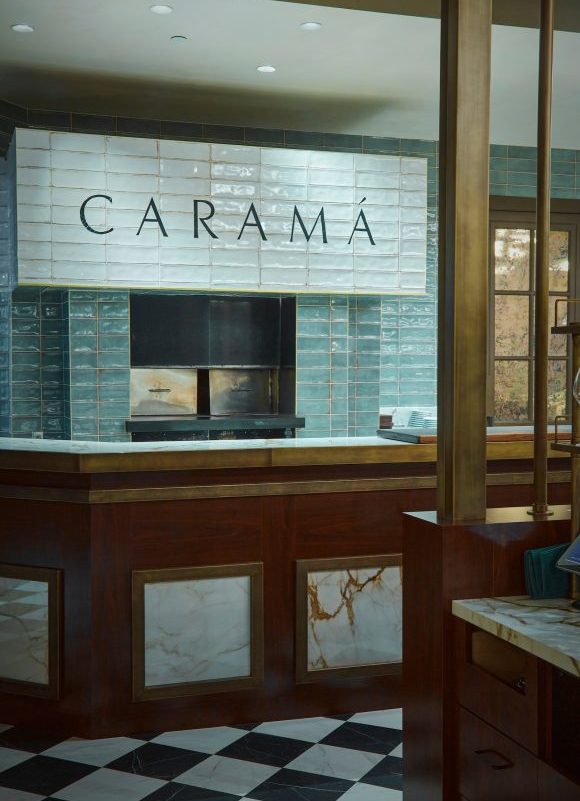Wolfgang Puck’s Las Vegas Eatery, CARAMÁ, Is A Tribute To His Past, Present & Future
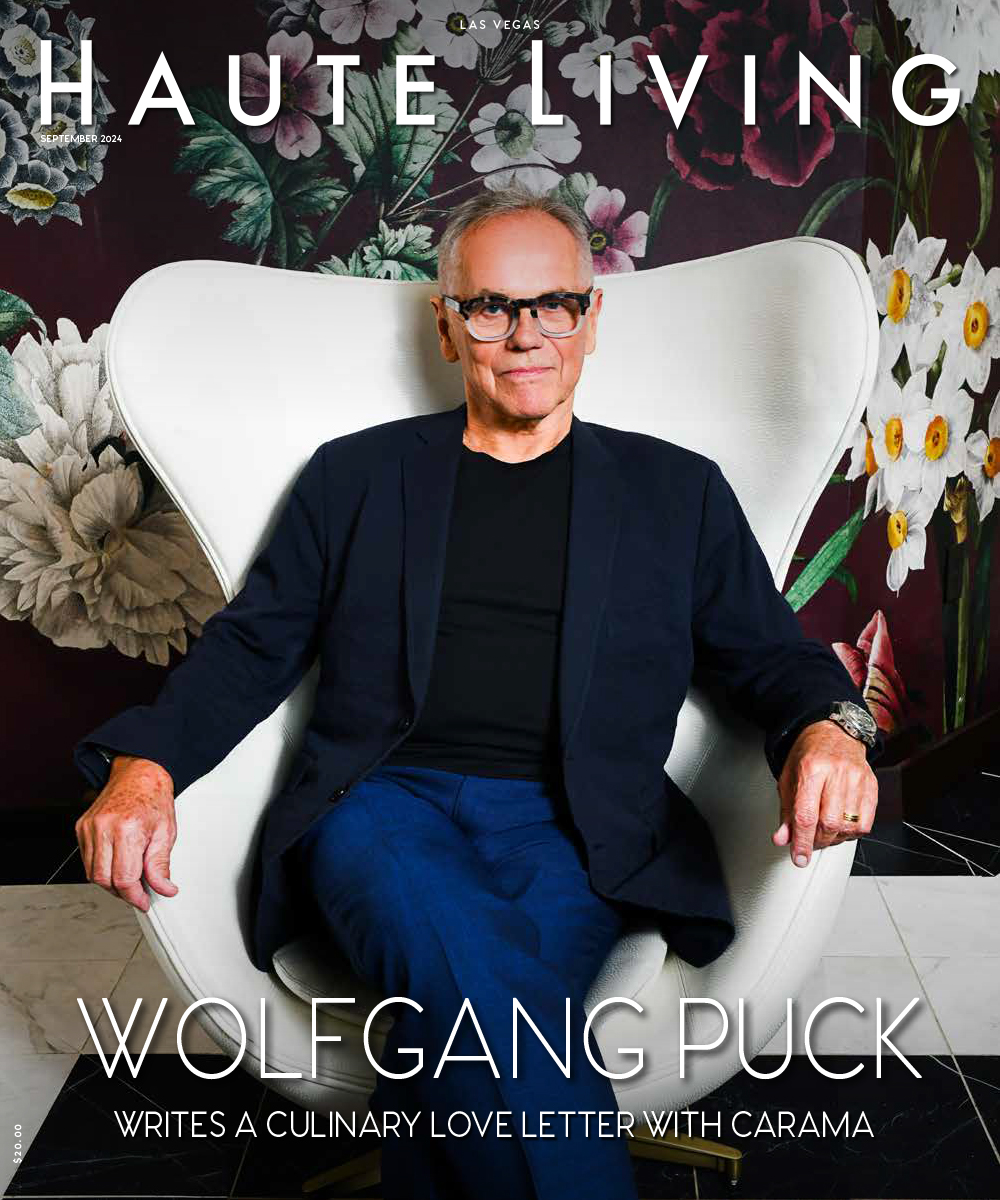
BY LAURA SCHREFFLER
PHOTOGRAPHY ANDREAS BRANCH
GROOMING BJ BATTERMAN
SHOT ON LOCATION AT CARAMA, LAS VEGAS
WOLFGANG PUCK IS TAKING A TRIP DOWN MEMORY LANE, and I am willingly along for the ride.
We’re at the famed Austrian chef’s latest Las Vegas eatery, CARAMÁ, which opened earlier this year at Mandalay Bay in the space formerly occupied by his casual Italian eatery, Lupo. CARAMÁ, which translates to “dear mom,” was conceived as a tribute to his mother, Maria, but in truth, it symbolizes far more than that: it is a glimpse into his past, his present, and his future, and serves as a reminder of how far he’s come.
A beautiful shot of Puck, now 75, and his mother, taken in her garden 27 years ago, which served as the eatery’s inspiration, liberally dot its walls, a focal point among the 6,500 square-foot, Denis Frison-designed space, taken 20 years ago, he says, before her passing at age 78 in 2004. The eatery takes guests on a journey through the streets of Milan with beautifully detailed tiles, marble, brass, and wood finishes inspired by the Galleria Vittorio Emanuele II; brass light fixtures and chandeliers; a stunning, 49 foot-long bar with an arched canopy and a backdrop highlighted by mirrors and wallpaper depicting flowers from a beautiful Italian garden; archways and curves of Italian columns; the Salumeria, inspired by an historical shop in the Via Montenapoleone; a cellar with over 7,000 bottles; an open pizza oven, detailed with tile; and a gelato cart.
It was Maria, a pastry chef, who encouraged and inspired his passion for food from a very early age. He learned the craft from her, in fact, while growing up in Sankt Veit an der Glan, Austria. And so, naming the restaurant “dear mom” — an actual letter of which appears on the back of its menus with the plea to “savor every memory” — made perfect sense.
“[I decided to name CARAMÁ after my mother because] I always admired her for many reasons,” he shares, after we’ve clinked glasses of champagne, toasting to happiness and health. “One, for her love of [my three siblings and I]. Two, for her tenacity. She didn’t kill my stepfather, which she should have; he was a horrible man. But mainly, because she could cook with so little and make really great food.”
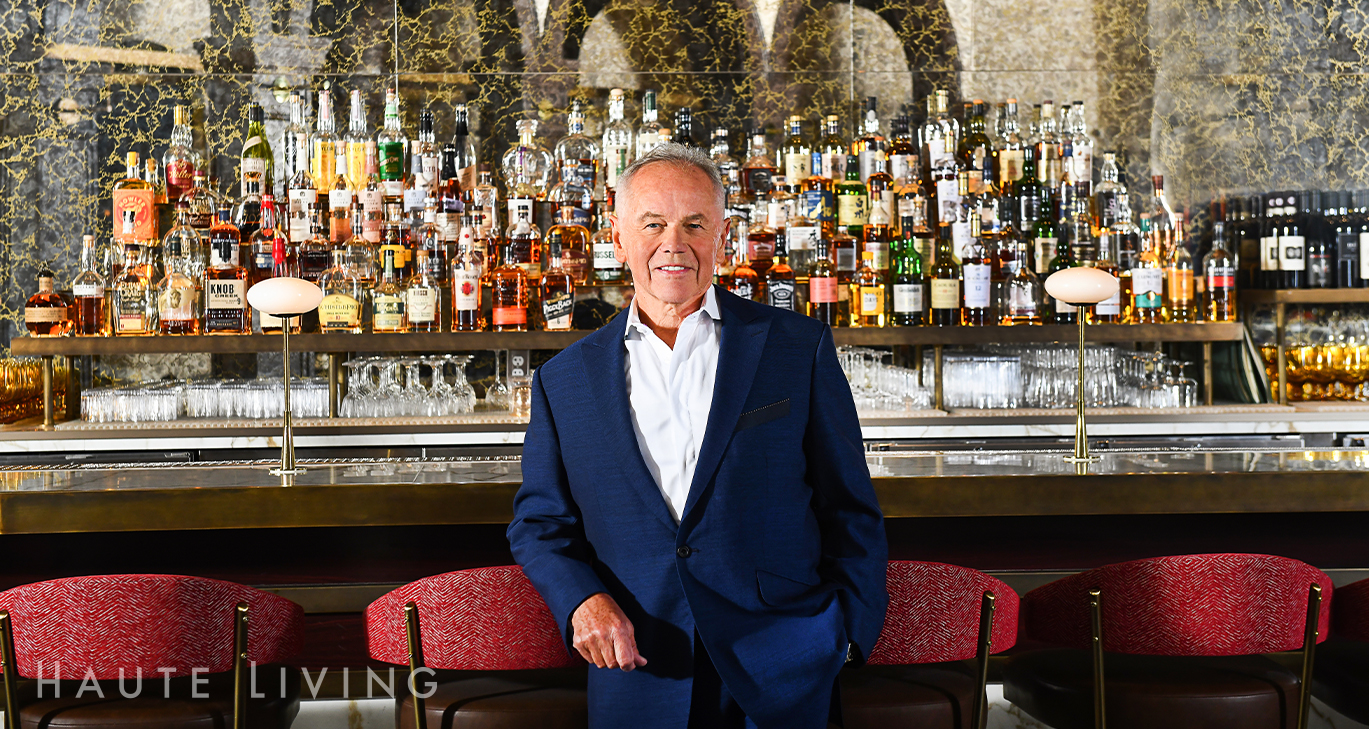
He shares that his family — sister Christina, 73, brother Klaus, 58, who lives in Las Vegas and works for Puck Fine Dining Group, and late sister Maria — all of whom bear his stepfather Josef’s surname [Wolfgang took this on after his mother’s remarriage in 1953] grew up poor in Austria, but rarely wanting for delicious food. Though they could afford meat only once a week, his mother still managed to craft innovative fare for the family: dishes such as homemade noodles, the dough kneaded by hand, and palatschinken, thin crepes filled with marmalade. They picked raspberries from a wild, untamed forest, feasted like royalty on vegetables from a robust garden, and raised pigs, producing their own salumi (the inspiration behind CARAMÁ’s beautiful, Deco-style salumi bar, which features its own meat slicer) — ham, speck, and sausages, as well as rich, homemade cheese. Summers were spent eating bountiful salads picked from the family garden, while winter dishes included a hearty, family-favorite soup made of noodles, sauteed onions, ham, and cabbage cut into thin, wistful slices.
“We never went hungry, and we never felt like we needed to have the best of the best, like steak,” he recalls now.
Yet, this is what he serves his patrons — updated, elevated takes on the delicious food of his youth — served on Italian-crafted tableware from Giorni, reminiscent of the “special” plates Maria would only bring out at holidays, and walls blooming with carnations and daffodils, her favorites. With access to the best ingredients in the world, Puck does not need to get creative to make ends meet, but make no mistake, he does get creative indeed, crafting items worthy of his three Michelin stars.
He still serves the salumi he was raised with, but in a gourmet way that embraces her “idea and spirit, an evolution” that fits with the concept of the restaurant, with items like Salumi Finocchiona, served with marinated artichokes, parsley, and chilies; an assortment of cheeses, artfully arranged with honeycomb and black mission figs drizzled in Balsamic vinegar; and beef Bresaola, made of air-dried Italian beef, served with an eggplant caponata sauce, all vying for attention.
There are other nods to his mom, too, in his wood-fired meatballs, made of both beef and pork (a symbol of his past and present), served with whipped ricotta, pomodoro sauce, and basil; a fennel and arugula salad with black olive and dried tomatoes in a blood orange vinaigrette; a slew of homemade pastas; and veal parmigiana, which he nor his family could personally afford to have growing up.
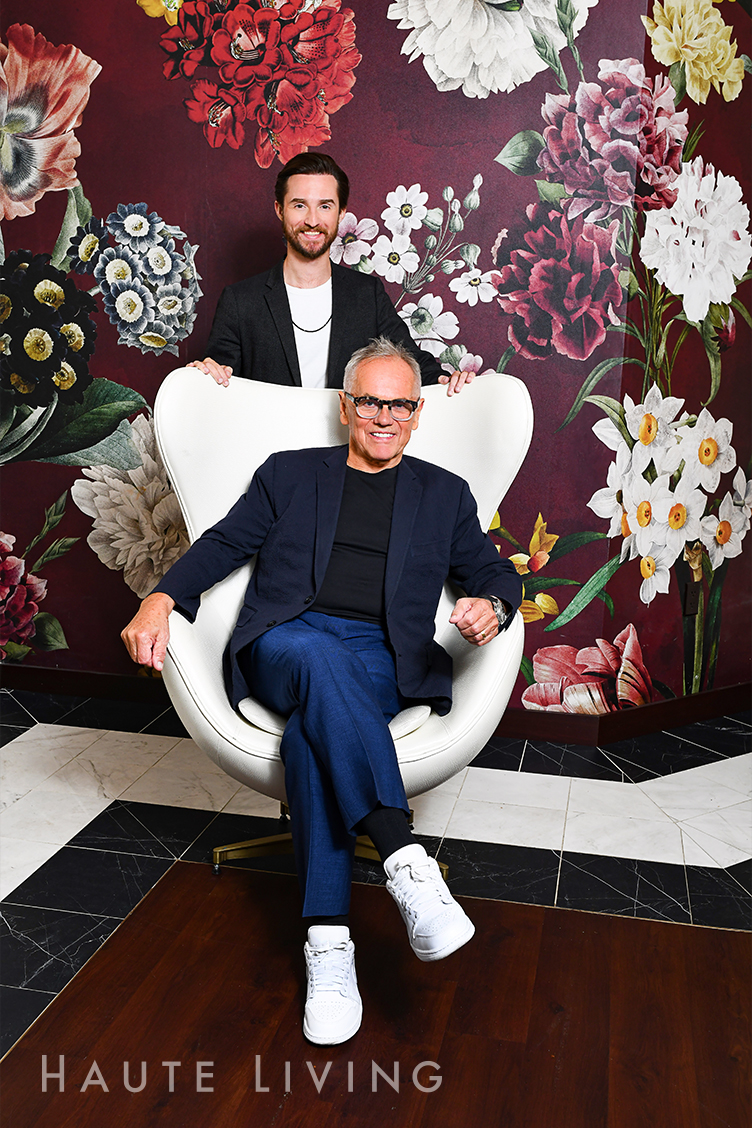
But though his family lacked wealth, Puck does not look at this as detrimental. The opposite, in fact; it gave him purpose. And so, 20 years after her death, he decided to come full circle, with a restaurant in her honor, which finds its soul through the aforementioned letter of love, which reads: “As a young boy, I watched you shape the world around me. I can remember the smell of fresh basil on your hands as you fixed my unruly hair. I remember your laugh. I remember our long conversations about tradition, and the way your hands felt after hours of forming noodles. I remember your garden soup. But just as much, I remember your defiance. You were a passionate, rule breaking artist who didn’t care about what others thought of your ideas. You inspired me, and as I have grown into the man that I am, I can trace all of my best qualities right back to you. You taught me that invention is the mother of tradition, and that tradition lingers in our soul. I learned that both tradition and invention are vital; you showed me that the past and present can live in whatever new recipe we create by mixing them together. It has become my defiant passion. My new restaurant is my letter of love to you, mother. I will show the world what I learned from you, and how it feels to taste tradition and invention in the same bite.”
Puck does feel that his mother would have been impressed by what he’s done here — in life, she always was. “Obviously, she was very proud of me,” he notes. “She always said, ‘Why do you need another restaurant? Why do you do this?’ I would say, ‘You know, I love it.’”
He always has — since age 14, when his stepfather kicked him out of the house and he found solace in kitchens around the world, cooking has always been an escape. He quietly recalls the moment he chose this as his way out, instead of another — standing on the bank of a river, despairing that he had nowhere to go, that the situation at home with his stepfather was too painful, and that life was not worth living. But when he made his choice — when he chose himself — the need to prove himself, as a result, was great. His ambition fueled his career from his earliest days, which included stints at Maxim’s in Paris, the Hotel de Paris in Monaco, and the Michelin 2-starred L’Oustau de Baumanière in Provence. At the age of 24, he took the advice of a friend and left Europe for the United States, first working in the Midwest at La Tour in Indianapolis from 1973 to 1975, before heading to Los Angeles to work at Ma Maison in West Hollywood, where his cuisine became beloved by the rich and famous, and eventually led to the inception of his Wolfgang Puck Fine Dining Group empire when he opened Spago in 1982 — a restaurant that has been opened for more than 40 years and has received dozens of accolades, including two Michelin stars, the prestigious James Beard Foundation Award for Outstanding Chef of the Year in 1991 and 1998, and the James Beard Foundation Award for Restaurant of the Year in 1994 (side note: he is the only chef to have won the Outstanding Chef of the Year Award multiple times).
And now, like his mother did with him, Puck is passing along that family legacy to the second eldest of his four sons, Byron. The 29-year-old, who joined his father on our shoot, posing underneath the photo of Wolfgang and Marie to highlight three generations of Pucks in one place, is poised to not only take over, but expand the business that Puck has spent his life building.
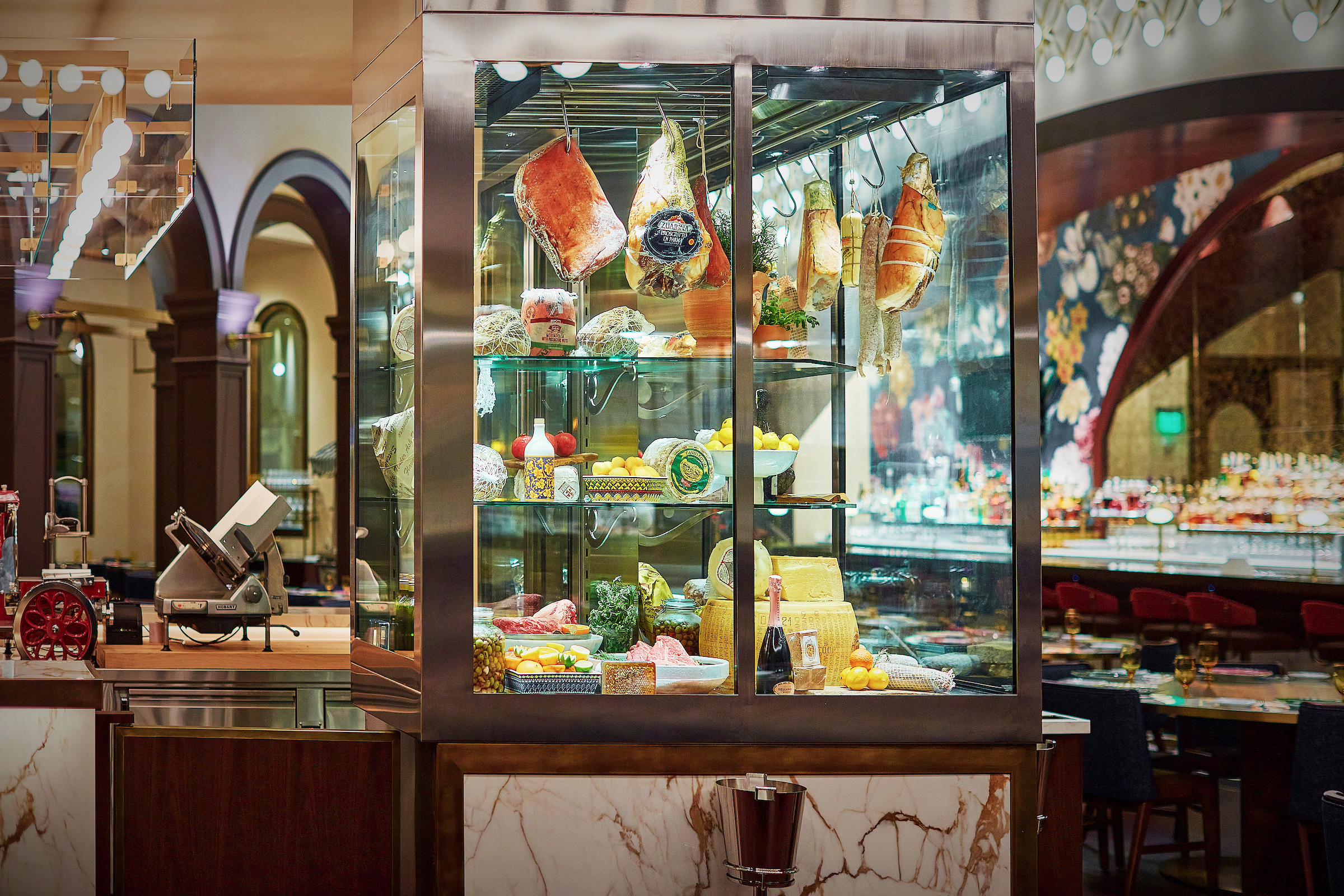
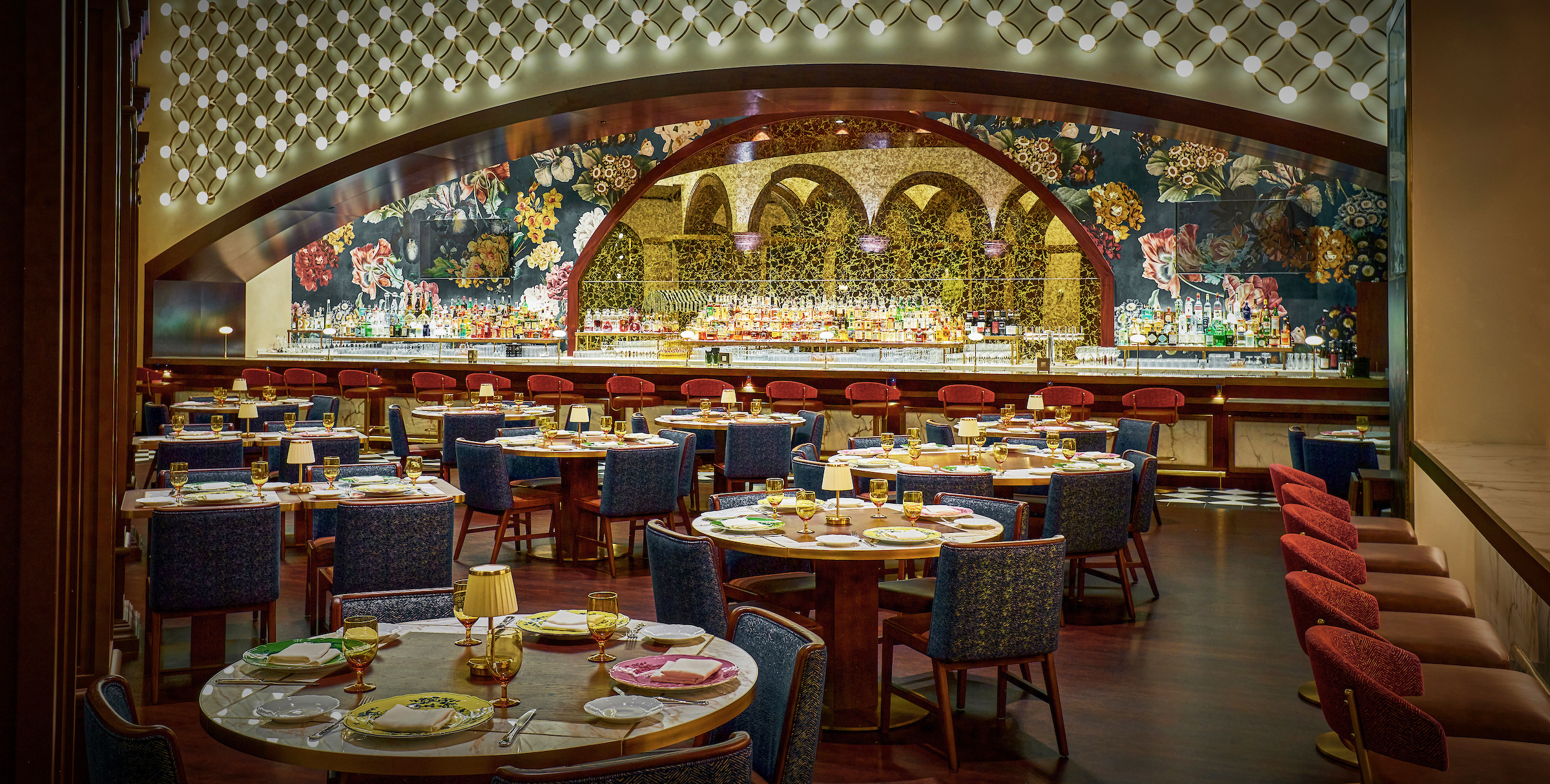
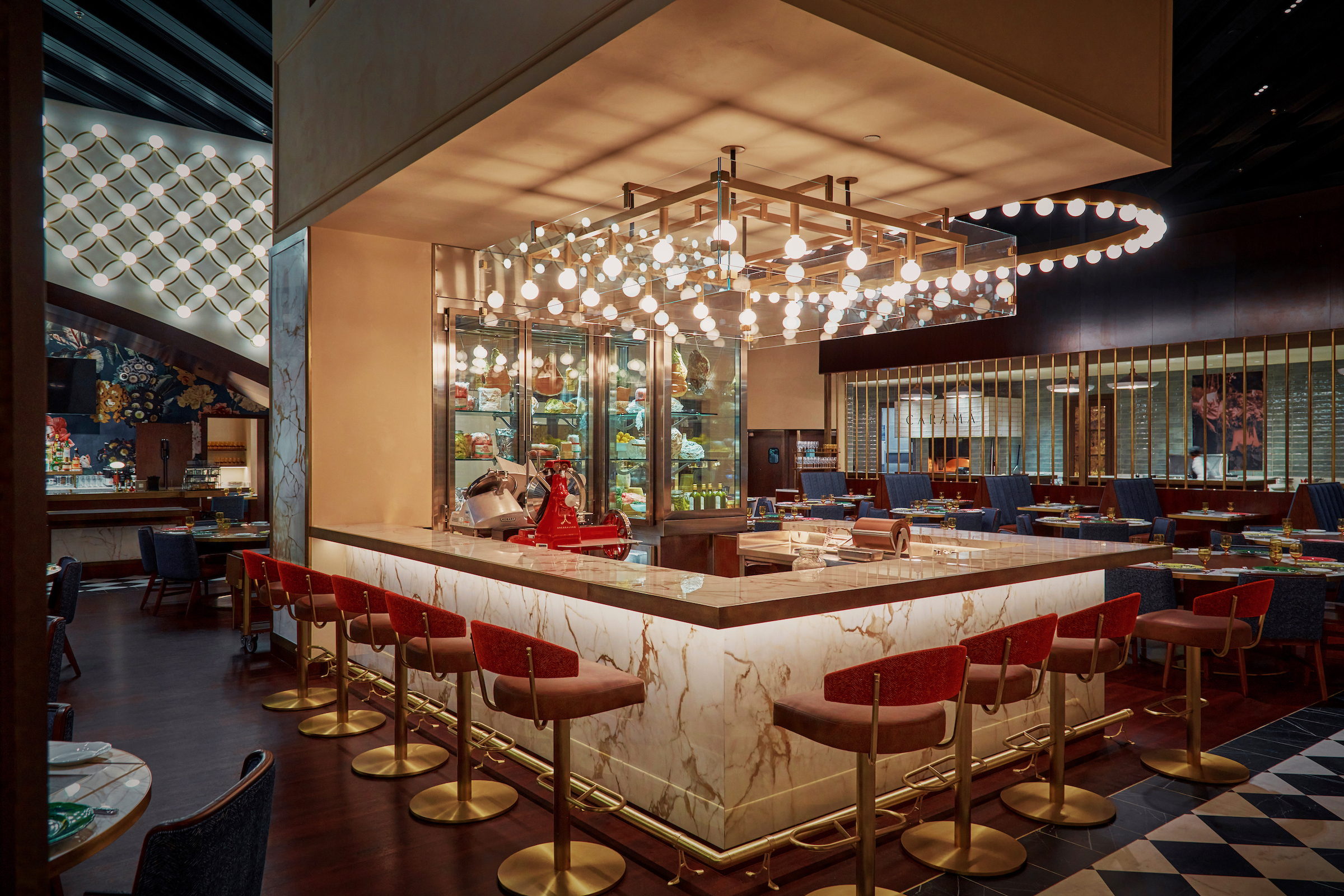
Wolfgang, however, had no intention of simply handing over his empire; his son has worked for it, first as a dishwasher at Spago, then spending time training under prestigious chefs, just as Puck himself did — though Byron’s stints were truly unparalleled (they included working underneath Matsuhisa in London as well as Eric Ripert at Le Bernadin in New York, at Alinea in Chicago, and Celler de Can Roca in Spain). He attended Cornell’s hospitality school to learn how to run a business, which is what he’s currently doing, flitting around the world, creating opportunities and developing new business whilst working alongside his dad — something Puck himself never had the ability to do.
“I wish my mother was able to see this,” he declares wistfully, quietly, his Austrian accent still thick after nearly 50 years in the States. “To not only have one generation, but the next one already involved in the food business, she would have been so proud. I’m really proud. It feels amazing having my son working with me; there’s nothing better than the success of your kids.”
He smiles, sharing that his eldest son, 35-year-old Cameron, was the first in the family to earn a PhD, and is equally ecstatic that Byron is the first to join what has become his own life’s work. “He has learned a lot over the last few years, but he had to learn a lot,” he notes. “In our profession, you always have to be interested in new things. You have to keep your eyes open, and you have to listen. I told him, ‘The people who have been working with me have been with me for years and years; you don’t go in and tell them what to do. You listen to them and let them speak first always, so that way, they can figure things out without your direct involvement.’ Then they’ll be like, ‘this kid is good, you know?’”
The father-son working relationship seems to be working well. The younger Puck opened his first restaurant under the Wolfgang Puck Fine Dining Group in 2021 with West Hollywood’s Merois, and orchestrated the opening of Spago in Bodrum earlier this year, serving as its general manager, and is working on brand deals in Perth and Athens, among other places.
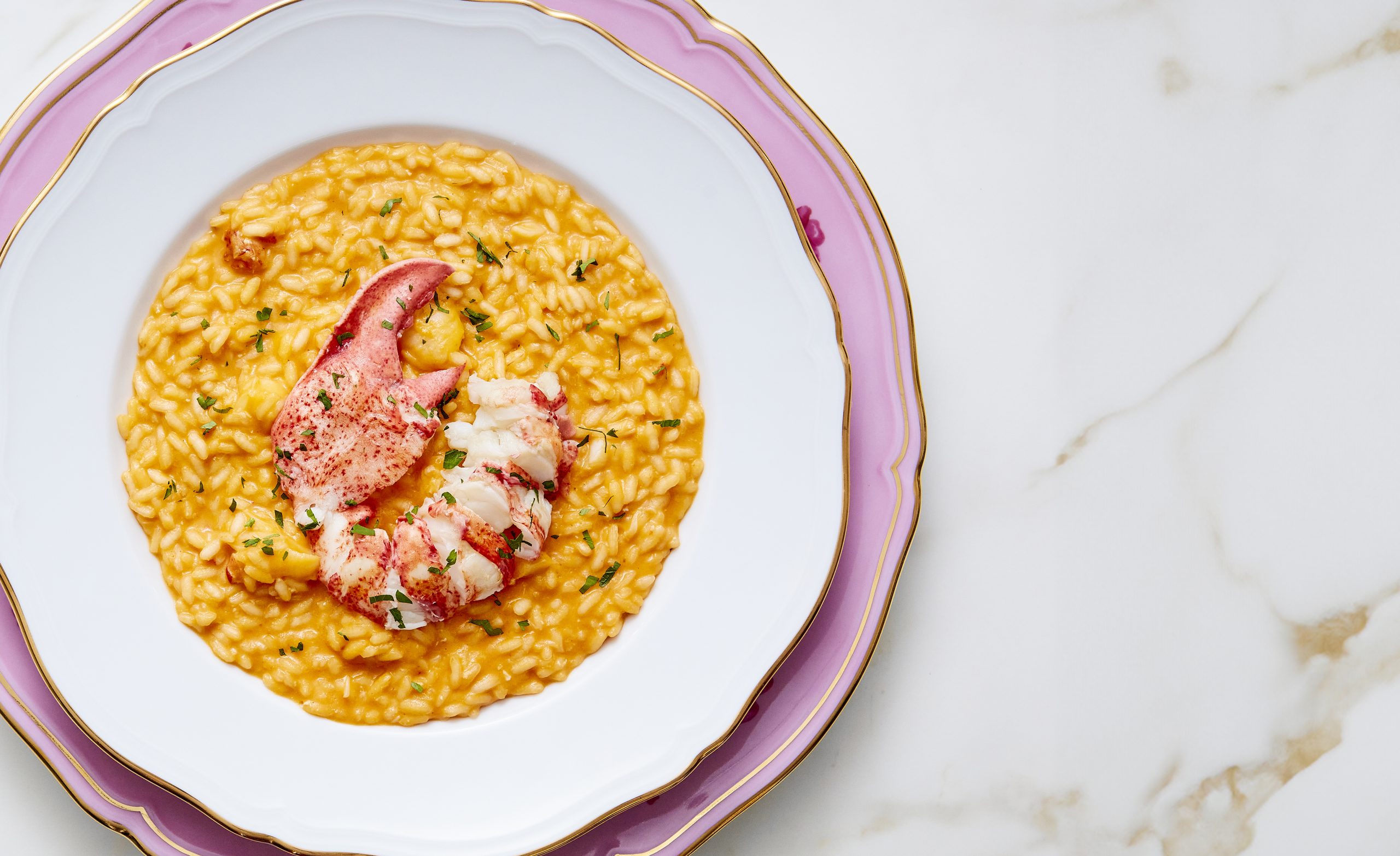
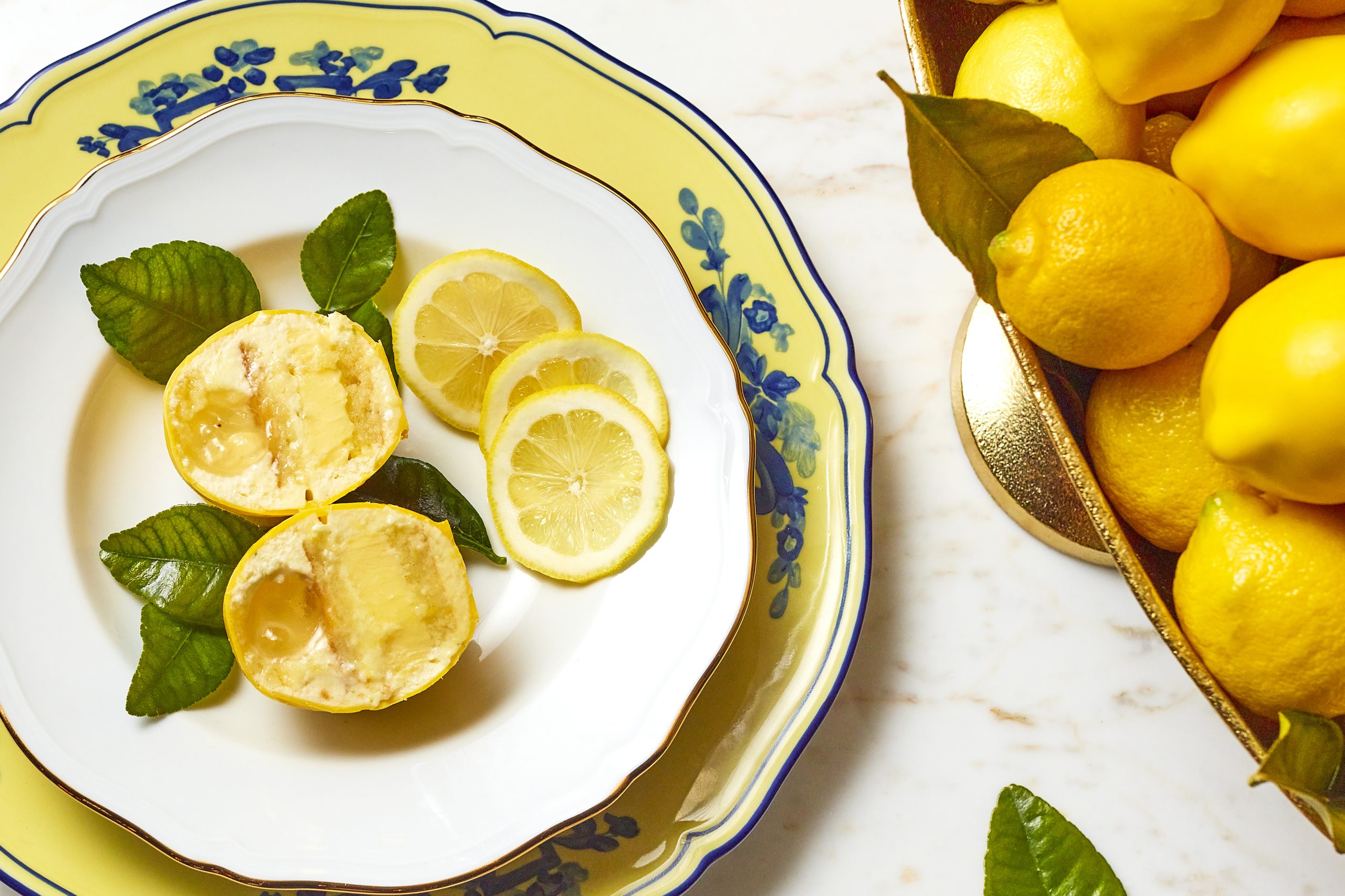
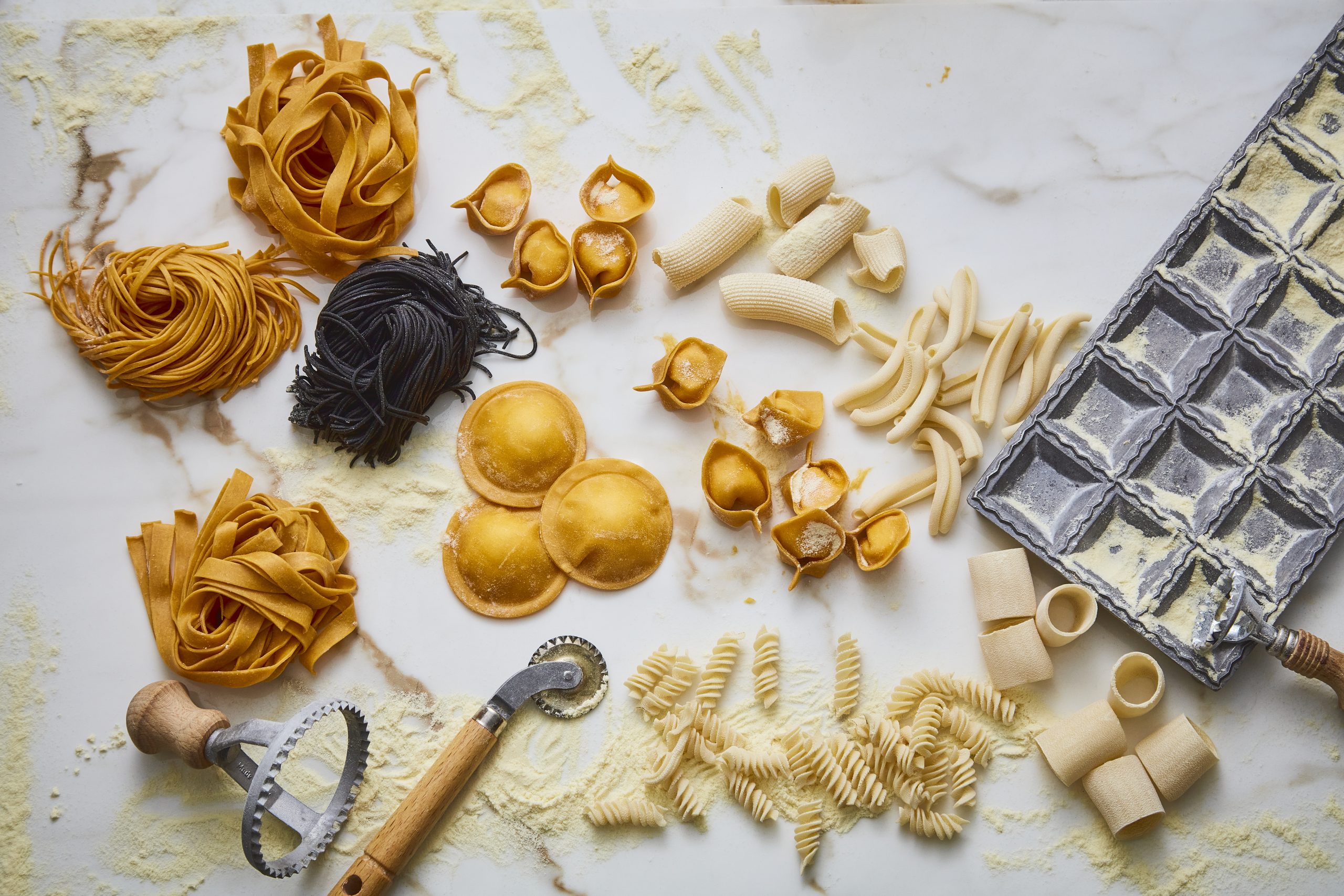
“Sometimes it happens, sometimes it doesn’t — it’s a bit like a dating game, finding the right business partner instead of the right person. Byron does that, but he is also good with cocktails, he’s good with wine, and he’s especially good with people. I don’t want him in just one kitchen. If something happened to me, I want him to know all the restaurants, so he’s traveling a lot with me, as well as by himself. I think he will be a very good leader.”
He’s also leading the charge on some major new business development, including a collaboration with the upcoming Four Seasons Residences Las Vegas, and, in the future, a Wolfgang Puck hotel à la Nobu Hotel. “Byron is going down that avenue now; we are trying to have a smaller boutique hotel with great food, great service, and great amenities — maybe a spa, too. So that way when people come, they really feel special and get an experience. Travel has changed throughout the years. [Luxury hotels] were great 25 years ago, but travel has changed. If it’s just for sleep, that’s boring. There has to be more these days — entertainment mixed with food and wine, but in a fun way.”
Instead, he says, it would be modeled in part after Aman, a brand he respects but believes he could improve on in the culinary department. Ideally, he’d open his first hotel in Santa Ynez, Santa Barbara, or even Laguna Beach. He’s also tying around with the idea of opening in a vineyard, as well as a cooking school, where a guest could “learn how to cook and be pampered so you could feel like you’ve accomplished something, but also had a break.”
The signature restaurant is up for debate as well given that he has so many global brands, inclusive of CUT, Spago, and Chinois. If he expands, the restaurant will need to fit the location. An updated version of Chinois, for example, could appear in Washington state because of its access to great fish and produce. Texas would be a better fit for CUT. He’s dreaming big. “The whole package needs to fit, so we’ll see,” he says.
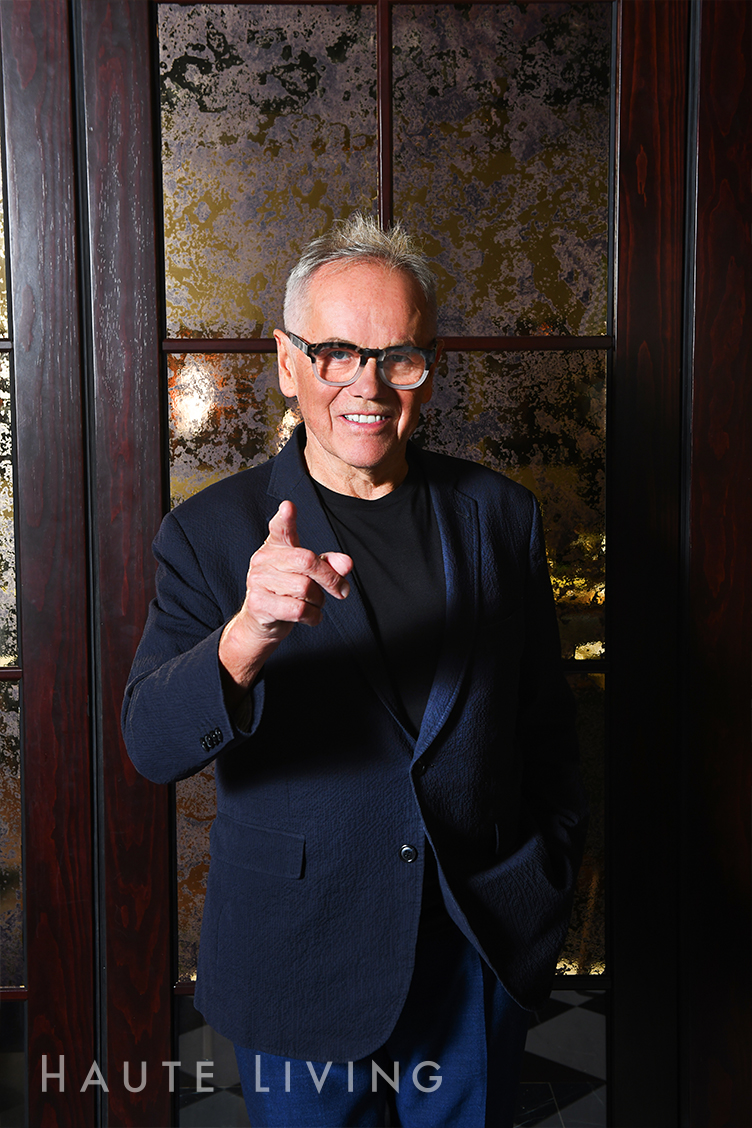
But it is coming, and with Byron beside him, it’s no longer a far-flung, unmanageable dream. Additional future ventures include expanding his HSN product range, doing another television show (he’s appeared on a plethora, from Iron Chef America to Top Chef Duels, among others), will continue to expand his restaurants on a global scale as well as keep the existing favorites going, to work with his Wolfgang Puck Catering group, which has produced the Academy Awards’ Governors Ball for the past 30 years, and maybe even do a book about his life with Assouline, which is in the works.
“I always have to be doing something,” he admits. “Like, I talked to the chef in London. He’s doing a pop-up. He said, ‘are you going to come?’ and I said, ‘no, I can’t, I have no time.’”
That’s putting it mildly. Since opening Spago in 1982, he has grown an empire, opening Chinois in Santa Monica and CUT in Beverly Hills, accruing three Michelin stars, launching the Wolfgang Puck Fine Dining Group, Wolfgang Puck Catering, and Wolfgang Puck Worldwide, Inc., a privately held corporation that includes a rapidly growing portfolio of company owned and franchised locations of casual dining and fast-casual restaurants, as well as consumer products including Wolfgang Puck packaged food and beverages, book publishing, and other licensing and merchandising projects. From airports and universities to hospitals, casinos and street-side restaurants, these concepts include over 50 locations with a portfolio that continues to expand. He has made a name for himself as a communicator as a regular guest on ABC’s Good Morning America since 1986, the year he also produced his first instructional cooking video, Spago Cooking with Wolfgang Puck. His Emmy Award-winning television series, Wolfgang Puck, debuted on The Food Network in 2001 and aired for five seasons. He has also written seven cookbooks. And he is directly responsible for bringing haute cuisine to Las Vegas as the first celebrity chef in the city, opening Spago in the Forum Shops at Caesars in 1992, with an additional six restaurants in Sin City, including the now-shuttered Postrio Bar & Grill at The Venetian in 1999 and the aforementioned Trattoria del Lupo at Mandalay Bay.
Puck can’t believe how much the city has changed, recalling what it looked like in its earliest days as a burgeoning culinary destination — a destination that he built — mostly, he admits, because he loved boxing. “That’s one of the main reasons I said, OK, we’re going to open. I used to come to Caesars Palace. Where they built the stadium to watch the fights for Marvin Hagler, Sugar Ray Leonard, Thomas Hearns, and others. And sure enough, when there were fights, all the Hollywood people — from Tony Robinson to Jack Nicholson, Sly Stallone, and Arnold Schwarzenegger — would come to my restaurant after the fight.”
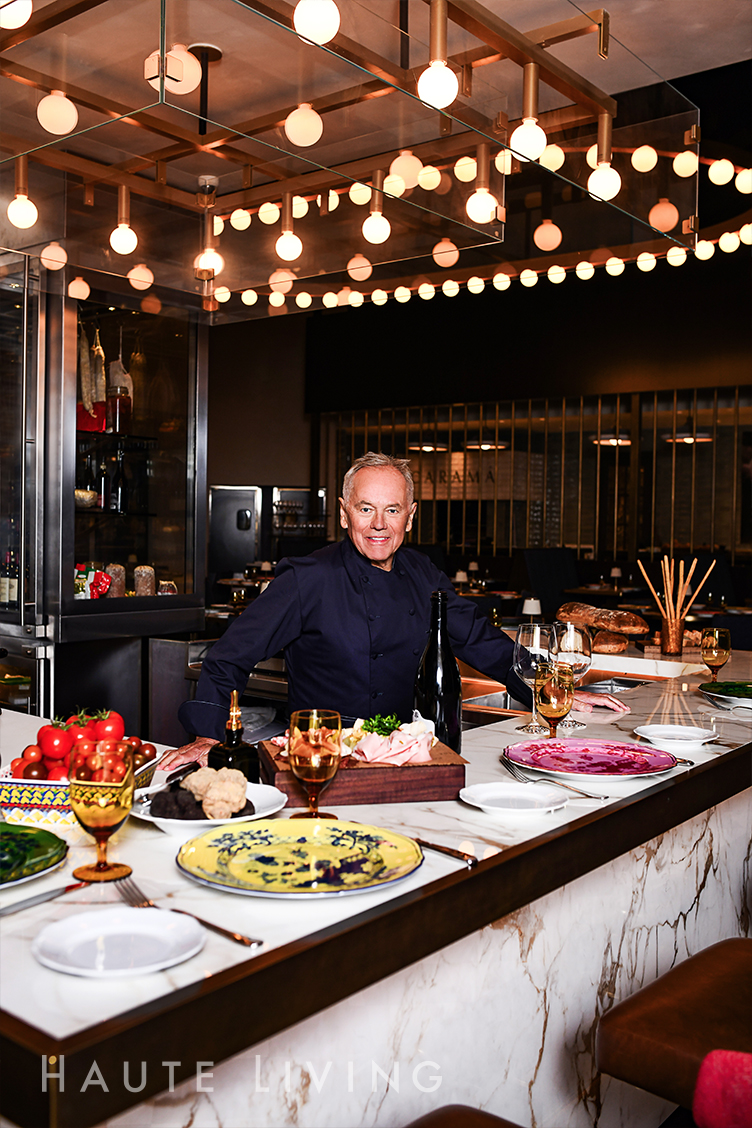
Yet, success wasn’t instant, and he doubted his decision from the get-go. “When we opened in 1992, Vegas was a really small town. When we opened Spago at the Forum Shops in November or December, and at that time of year, business was so slow. I knew Siegfried and Roy at that time. The show was closed and most of the other shows were closed too, if not all of them; everybody went on vacation in December before Christmas then. And I said, shit, I made the biggest mistake to open in Las Vegas; there’s nobody here. But then, come Christmas and New Year, it started to get busier and busier. And then, in the beginning of January, they had the Consumer Electronics Show, and from then, we had people lined up out the door. It goes through ebbs and flows depending on the season, but Las Vegas has also gone from 700,000 people to 2.5 million or more; it has become such a big place. Now, Las Vegas has everything.”
As, it seems, does Puck, who loves his life entirely despite having very little free personal time. But no matter, because he can’t sit still anyway — motion, movement, and ambition have always fueled him.
“I love this life, because I always like to be doing things. I don’t like to sit at home and be bored. Even when I’m off, I wake up at 6:30 and walk my dog, and then I go to the gym. I might head to the farmer’s market after, because I like to cook at home, too. My wife always says, ‘just relax.’ But for me, cooking is relaxing. Even going to the market is relaxing, because I really enjoy the journey. I do enjoy vacations, because I like to experience new things and places for sure — but I think I like them even better if they are intertwined with food and I’m cooking.”
He recounts a recent family vacation to Bodrum, where he also checked in on the new Spago that Byron was overseeing. Although he enjoyed it — mostly because he was with his people — he could only do it for a finite period of time. Because time is fleeting, of that he is wholly aware. His youngest sons, 17-year-old Alexander and 19-year-old Oliver, are about to leave the nest as they head to college — leaving Puck and his wife of 17 years, Gelila Assefa Puck, on their own. But kids have to leave sometime, he says pragmatically, and he will always be their biggest fan and supporter.
Which is why time, to him, is the greatest luxury. “You cannot buy it,” he notes. “And as you get older, you start to think about how much time you have left, and how you’re going to use it in the best way. And the answer is: with a few great friends, and with family. Always with family.”
No doubt, his dear mama — his caramá — would have agreed.
